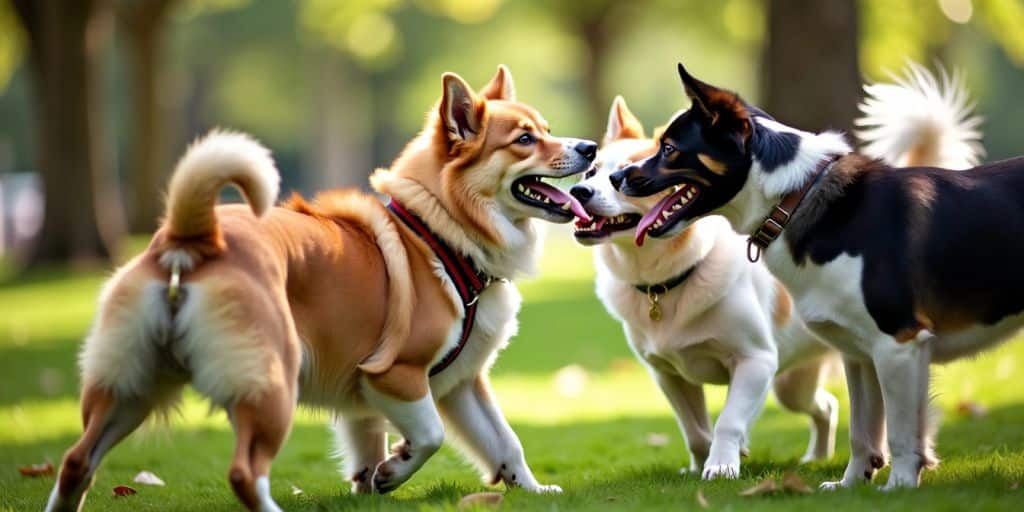Socializing your dog is a vital part of their growth and happiness. It helps them become well-adjusted and confident pets. Proper socialization can reduce issues like fear and aggression, making for a happier and healthier dog. This guide will provide essential tips for effective dog socialization, ensuring your furry friend thrives in various situations.
Key Takeaways
- Start socializing your puppy early for better results.
- Use positive reinforcement to encourage good behavior.
- Introduce your dog to new experiences gradually.
- Monitor your dog's body language for signs of stress.
- Consider puppy classes for structured socialization.
Understanding the Importance of Dog Socialization
Why Socialization Matters
Socializing your dog is super important for their happiness and well-being. It helps them learn how to react positively to new situations, people, and other animals. Dogs that aren’t socialized can become fearful or aggressive, which can lead to behavior problems later on. By exposing your dog to different experiences, you’re helping them become more confident and adaptable.
Benefits for Your Dog
Socializing your dog has many benefits:
- Increased Confidence: Dogs that are used to different environments are less likely to be scared or anxious.
- Better Behavior: Socialized dogs are less likely to develop bad habits like excessive barking or destructive chewing.
- Enjoyable Outings: You can take your dog to more places, like parks and cafes, without worrying about their behavior.
Common Misconceptions About Socialization
There are some myths about dog socialization:
- Myth: Only puppies need socialization.
- Fact: Dogs of all ages benefit from socialization.
- Myth: Socialization is just about meeting other dogs.
- Fact: It also includes exposure to different environments, people, and experiences.
- Myth: Socialization can only happen in the first few months of life.
- Fact: While early socialization is crucial, older dogs can also learn to enjoy new experiences with patience and positive reinforcement.
Remember, every dog is different. What works for one might not work for another. The goal is to find what makes your dog happy and confident.
By understanding the importance of socialization, you’re setting your dog up for a happier, healthier life!
Starting Early: Socializing Your Puppy
Key Socialization Periods
The first few months of your puppy's life are super important for their social skills. Starting early is key! The best time to introduce them to new experiences is between 3 and 14 weeks old. During this time, they are curious and open to learning about the world around them.
Introducing New Experiences
To help your puppy grow into a confident dog, gradually expose them to different sights, sounds, and environments. Here are some fun ideas:
- Take them for car rides.
- Let them walk on various surfaces like grass, concrete, and sand.
- Introduce them to household noises like the vacuum cleaner or doorbell.
Make sure these experiences are positive and rewarding. Use treats and praise to encourage good behavior!
Puppy Socialization Classes
Consider enrolling your puppy in a socialization class. These classes provide a safe space for your puppy to meet other dogs and people. They learn valuable social skills while having fun!
Puppy socialization classes are a fantastic way to ensure your dog grows up to be a well-adjusted and happy pet.
By starting early and using positive reinforcement, you can help your puppy become a confident and friendly companion. Remember, the goal is to make every new experience enjoyable!
Effective Techniques for Dog Socialization

Controlled Introductions to Other Dogs
One of the best ways to help your dog socialize is through controlled introductions to other dogs. Start by making these encounters positive. For example, reward your dog with treats when they see another dog from a distance. Gradually decrease the distance as your dog becomes more comfortable. This method helps your dog associate other dogs with positive experiences.
Using Treats and Rewards
Positive reinforcement is key to effective socialization. Whenever your dog behaves well, like sitting calmly when meeting new people or dogs, reward them with treats, praise, or playtime. This approach encourages your dog to repeat the desired behavior, making socialization a fun experience for them.
Incorporating Play and Exercise
Play and exercise are essential for socializing your dog. Regular playtime with other dogs helps them learn social cues and build confidence. Activities like fetch, tug-of-war, and agility courses are great for this. Not only does this provide physical exercise, but it also offers mental stimulation, making your dog more adaptable in social situations.
Remember, socialization is an ongoing process. Be patient and consistent, and your dog will become more comfortable and confident in various social settings.
Summary of Techniques
| Technique | Description |
|---|---|
| Controlled Introductions | Gradually introduce your dog to other dogs in a safe environment. |
| Positive Reinforcement | Use treats and praise to reward good behavior during socialization. |
| Play and Exercise | Engage your dog in fun activities to build confidence and social skills. |
By following these techniques, you'll help your dog become a well-adjusted and friendly companion. Remember, every dog is unique, so adjust your approach based on their needs!
Socializing Your Dog with People
Introducing Your Dog to Friends and Family
Start by introducing your dog to friends and family in a calm and controlled environment. This helps your dog feel safe and secure. Encourage your guests to offer treats and speak softly to your dog. Positive interactions will help your dog build trust and feel more comfortable around new people.
Handling Interactions with Strangers
When meeting strangers, it's important to stay calm and confident. Your dog will pick up on your energy. Allow your dog to approach new people at their own pace. If your dog shows signs of anxiety, give them some space and try again later. Remember, patience is key.
Building Positive Associations with New People
Create positive associations by rewarding your dog with treats and praise when they interact well with new people. This reinforces good behavior and helps your dog feel more at ease. Over time, your dog will learn that meeting new people is a positive experience.
Socializing your dog with people is essential for their well-being and helps them become a well-rounded and happy pet.
Gradual Exposure to Different Environments
Starting with Safe and Controlled Environments
When you begin socializing your dog, start in safe and familiar places. This could be your backyard or a quiet park. These settings help your dog feel secure and reduce the chances of overwhelming them.
Gradually Increasing Exposure
Once your dog is comfortable, you can slowly introduce them to new experiences. For example, take them to a friend’s house or a busier park. The key is to take baby steps and ensure each new experience is positive. Here’s a simple plan to follow:
- Start Small: Begin with familiar places.
- Increase Gradually: Move to busier areas as your dog becomes more comfortable.
- Use Positive Reinforcement: Reward your dog with treats and praise when they handle new environments well.
- Stay Calm: Your dog can sense your emotions, so remain relaxed to help them feel secure.
Recognizing Signs of Overwhelm and Anxiety
It’s important to watch for signs that your dog is feeling overwhelmed. Look for behaviors like:
"Unlock the Secrets to a Blissful, Healthier Puppy: Discover the Benefits of Holistic Housebreaking"
- Freezing
- Hiding
- Growling
- Excessive barking
If you notice these signs, take a step back and introduce them to new experiences more slowly.
Remember, socializing your dog is a gradual process. Patience and consistency are key to helping your pet become well-adjusted and confident in various social situations.
By following these steps, you'll help your dog become more confident and well-adjusted. This is a key part of ensuring they lead a happy and healthy life.
Highlight
Incorporating basic obedience training into your dog's routine can significantly enhance their confidence in new environments.
Advanced Socialization Strategies
Using Training Games to Enhance Social Skills
Training games are a fun way to help your dog learn social skills while bonding with you. These activities not only teach your dog how to behave but also make learning enjoyable. Here are some games to try:
- Hide and Seek: Have your dog stay while you hide, then call them to find you. This builds their confidence and strengthens your bond.
- Fetch with Friends: Play fetch with other dogs. This encourages friendly interactions and teaches your dog to share.
- Obstacle Courses: Set up a simple course with items to jump over or crawl under. This helps your dog learn to navigate different environments.
Monitoring Body Language
Understanding your dog's body language is key to successful socialization. Look for signs of happiness, like wagging tails and relaxed postures. Be aware of signs of stress, such as a tucked tail or growling. Recognizing these signals can help you step in before any negative interactions occur. Patience and observation are essential!
Seeking Professional Help When Needed
If your dog struggles with socialization, don’t hesitate to seek help from a professional trainer. They can provide personalized guidance and support tailored to your dog's needs. Here are some signs that it might be time to get help:
- Excessive Fear: If your dog shows extreme fear in new situations.
- Aggression: If your dog reacts aggressively towards other dogs or people.
- Inability to Relax: If your dog can’t calm down in social settings.
Remember, socialization is a lifelong journey. Keeping your dog engaged and confident will lead to a happier, well-adjusted pet.
Wrapping It Up: Your Dog's Socialization Journey
Socializing your dog is a fun and rewarding adventure! By introducing your furry friend to new experiences, people, and other dogs, you’re helping them grow into a happy and confident companion. Remember, it’s all about being patient and consistent. Celebrate the little wins along the way, and keep things positive. With these tips in your toolkit, you’re on the right path to raising a well-adjusted and joyful pup. So, get out there, explore, and let your dog make some new friends!
Frequently Asked Questions
Why is it important to socialize my dog?
Socializing your dog helps them feel comfortable in different situations, which can reduce anxiety and prevent issues like aggression.
When should I start socializing my puppy?
The best time to start is between 3 and 14 weeks old, as puppies are most open to new experiences during this period.
Can adult dogs be socialized?
Yes, adult dogs can also be socialized, though it may take more time and patience. Gradual exposure and positive reinforcement are important.
What challenges might I face when socializing my dog?
Common challenges include fear, anxiety, or aggression. It's crucial to take things slowly and use positive reinforcement to help your dog feel safe.
How can I tell if my dog is improving in socialization?
Signs of improvement include your dog being more relaxed in new situations and interacting positively with other dogs and people.
When should I get professional help for my dog's socialization?
If your dog shows severe fear, aggression, or anxiety that you can't manage, it may be time to consult a professional dog trainer or behaviorist.

